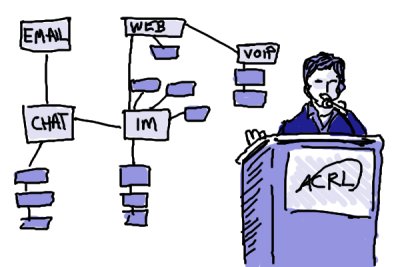Thanks to all those who took the time to submit articles and blog posts for consideration, It was much appreciated.
I have decided to divide this carnival into three sections, the fun, the geeky and the Strictly Library.
The Fun
As if web 2.0, library 2.0, and opac 2.0 weren't enough, we now have 'supermarket 2.0'!Thanks: @ the Library
Strictly Library
The Google's Librarian Central points us towards an article in Searcher Magazine explaining the Google book search digitization project.
Derik Badman presents his Comments and drawings from the ACRL Conference.
Also from the ACRL Conference, Jenny Levine writes about the latest experiments in IM reference services.
Connie Crosby let me know about Ellyssa Kroski's blogpost 'Information Design for the New Web', saying, "Ellyssa Kroski at Infotangle has put together an amazing outline of good, current web design with examples of existing websites. This is for her presentation at Computers in Libraries on Monday, and she has shared it all in a blog post. Outstanding!"
Here are the issues his post mentions:
- The Changing Nature of Publishing
- The Changing Nature of Metadata
- The Changing Nature of customers
- What's worth paying for?
The Geeky
Code4lib have published the videos and podcasts from the code4lib2007 conference.Daniel Chudnov points us at his article about standards for computers in libraries.
Well that's this edition of the carnival of the infosciences, please submit you suggestions to the next carnival host using the
carnival submission form.
The next host for this carnival hasn't yet been announced...
